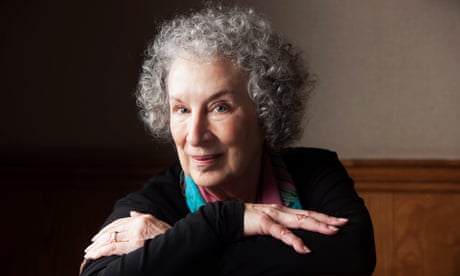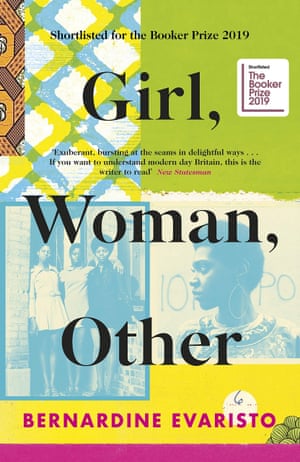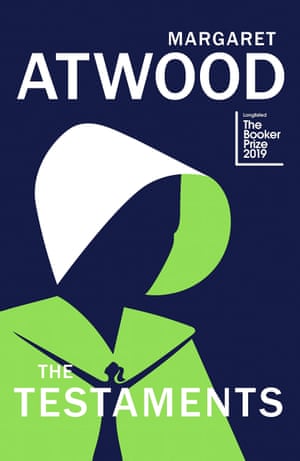Judging panel break rules in choosing The Testaments and Girl, Woman, Other as joint winners

The judges of this year’s Booker prize have “explicitly flouted” the rules of the august literary award to choose the first joint winners in almost 30 years: Margaret Atwood and Bernardine Evaristo.
Booker judges split between huge event novel and obscure choice
The chair of judges, Peter Florence, emerged after more than five hours with the jury to reveal that the group of five had been unable to pick a single winner from their shortlist of six. Instead, despite being told repeatedly by the prize’s literary director, Gaby Wood, that they were not allowed to split the £50,000 award, they chose two novels: Atwood’s The Testaments, a follow-up to her dystopian The Handmaid’s Tale, and Evaristo’s Girl, Woman, Other, which is told in the voices of 12 different characters, mostly black women.
Evaristo’s win makes her the first black woman to win the Booker since it began in 1969 and the first black British author. At 79, Atwood becomes the prize’s oldest winner. The Canadian author previously won the Booker in 2000 for The Blind Assassin; she becomes the fourth author to have won the prize twice.
“We were told quite firmly that the rules state we can only have one winner,” said Florence. “Our consensus was that it was our decision to flout the rules and divide this year’s prize to celebrate two winners. These are two books we started not wanting to give up and the more we talked about them the more we treasured both of them and wanted them both as winners … We couldn’t separate them.”

The Booker prize has been split twice before: in 1974, by Nadine Gordimer and Stanley Middleton, and in 1992, by Michael Ondaatje and Barry Unsworth. After 1992, the rules were changed to insist that the prize “may not be divided or withheld”.
“But the more we talked about it, [having two winners] seemed the only fair representation of our deliberations, which was why we felt the rules were inadequate to the problem we had been given,” said Florence. “We tried voting, that didn’t work. There’s a metaphor for our times.”
After more than three hours of discussions, the jury asked Wood if they could split the prize. They were told no. They went back into discussions for another hour, to come up with the same, unanimous choice. Wood spoke to the chair of trustees, Helena Kennedy, who also insisted on the rules being kept. The jury came back a third time, announcing with what Florence said was “absolute consensus”, that they had decided to ignore the rules.
“We spent a good hour and a half agonising over how to resolve the issue to the jurors’ satisfaction, and the eventual decision that was taken was a moment of joy for all of us,” said Florence. “We were trying to accommodate the rules that were given to us.”
But he said that trying to decide between the two novels was like a “judgment of Solomon”. “So how do you equably and fairly resolve something that seems irresolvable? You find a way of changing the game.”Advertisement
Asked if she supported the decision, Wood said she supported “the means by which the judges arrived at their decision”.
“They have actively broken the rules. The chair of trustees was also involved in saying no … It is an explicit flouting of the rules and they all understood that,” said the prize’s director, who was clear that the rules would not be changed in future – and that this year’s jury was not the first to ask to split the prize.
“There was nothing unclear about my communication of the rules, nor the trustees’ decision. That’s the choice they made. You can say what’s the point of rules but there will always be rebellions,” she said. “It was a rebellious gesture but it was … a generous one.”
The cash prize of £50,000 will be split between the two authors – Wood said the cheque would not be withheld despite the judges’ choice.
Florence said he did not believe the “power or the value” of the Booker “resides solely in the cash”. “I hope both winning authors will accept this as a mark of respect to two books,” he said.
The chair of judges, who was joined on the judging panel by Liz Calder, Xiaolu Guo, Afua Hirsch and Joanna MacGregor, said that The Testaments and Girl, Woman, Other were “fully engaged novels, they are both linguistically inventive, they are adventurous in all kinds of ways. They address the world today and give us insights into it and create characters who resonate with us, and will resonate with us for ages”.
Evaristo’s novel, he said, was “groundbreaking”, with “something utterly magnificent about the full cast of characters”; the novelist set out to write in a polyphonic series of voices as a “strategy against invisibility”, because “we black British women know that if we don’t write ourselves into literature, no one else will”. Atwood’s novel, meanwhile, is “more politically urgent than ever before”.
“These are big ambitious books,” said Florence. “One of the learnings I’ve had is that all the literary finesse, the elegance of language, the brilliance of structure, all these go to serve whether or not the author has something really valuable to say. These books both have something urgent to say and they also happen to be wonderfully compelling page-turning thrillers, which I think can speak to the most literary audience, as well as to readers who are only reading one book, or in this case two books, a year.”Advertisement
The two novels beat four other titles to the win: Lucy Ellmann’s Ducks, Newburyport, Chigozie Obioma’s An Orchestra of Minorities, Elif Shafak’s 10 Minutes 38 Seconds in This Strange World and Salman Rushdie’s Quichotte.
“Nobody was taking this lightly but equally there was a sense of perspective – we are judging a book prize, and this is a celebration of great literature,” said Florence. “There are opportunities to be joyful here.
Reprinted from The Guardian
https://www.theguardian.com/books/2019/oct/14/booker-prize-judges-break-the-rules-and-insist-on-joint-winners?fbclid=IwAR2olAuipmSbz34TIGwizLslyuMbABJCiN23tAm4TmX4lyUMgT5FMLPLVss






